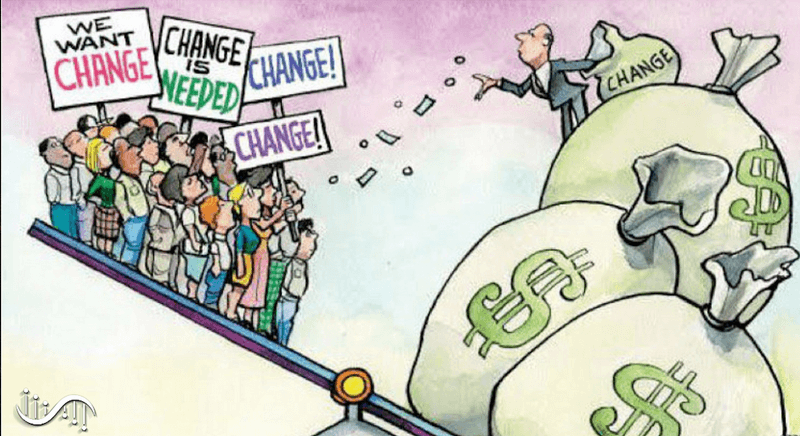Explore the baffling logic often displayed by the Baby Boomer generation. From outdated career advice to tech misunderstandings, discover 30 instances where their reasoning just doesn’t hold up today.
1. “Just walk in and ask for a job!” – As if companies still hire on-the-spot like it’s 1975.
“Just walk in and ask for a job!” echoes a time when job markets functioned differently. Back then, one could stroll into a company and leave with an offer. Companies valued face-to-face interactions, and job hunting was a personal affair.
In contrast, today’s job market is intricate, requiring online applications, multiple interviews, and digital networking. Resumes are screened by algorithms, not people.
Despite the outdated advice, there’s nostalgia for simpler methods. However, modern job seekers know that walking in with a resume might just result in closed doors and puzzled looks.
2. “Work hard, and you’ll get promoted!” – Meanwhile, wages stagnate while CEOs make 300x the average worker.
“Work hard, and you’ll get promoted!” suggests an era when dedication led to upward mobility. In their time, hard work was closely tied to advancement. However, today’s corporate landscape paints a different picture.
Wages have stagnated, and income inequality has widened, with CEOs earning exponentially more than average workers. Promotions are not just about diligence but also networking and strategic positioning.
The dream of climbing the corporate ladder is fraught with challenges, making this advice seem more like fantasy than practical guidance. The disparity between effort and reward is more apparent than ever.
3. “Buy a house in your 20s like we did!” – Ignoring that home prices have 10x’d since the ’70s.
“Buy a house in your 20s like we did!” reflects a bygone era of affordable real estate. Baby Boomers could purchase houses at reasonable prices, starting their adult lives with stability.
Today, soaring property prices make this dream nearly unattainable for many young adults. A simple home now costs multiple times what it did, creating barriers for first-time buyers.
This advice overlooks the economic realities of modern times, where financial burdens like student loans and stagnant wages make homeownership a distant dream for many.
4. “Why do you need a side hustle? Just get a real job!” – Says the generation with pensions and lifetime job security.
“Why do you need a side hustle? Just get a real job!” harks back to an era of job security and pensions. Baby Boomers enjoyed stable careers, often with benefits like pensions and promotions.
Today’s workforce faces gig economies and contract work, necessitating multiple income streams. Side hustles are not just trendy; they’re essential for financial stability.
This advice fails to consider the evolving nature of employment, where diversifying income is often a necessity rather than a choice. The modern job market demands adaptability and creativity.
5. “Stop buying avocado toast and you’ll afford a house!” – Because toast is the reason homes cost $500K.
“Stop buying avocado toast and you’ll afford a house!” is a critique that blames millennials for their financial woes. The idea is that saving on small luxuries leads to substantial savings.
In reality, the cost of occasional avocado toast is negligible compared to the skyrocketing property prices. This simplistic view discounts broader economic factors affecting young people’s purchasing power.
The statement, often delivered sarcastically, highlights generational misunderstandings and oversimplifies complex economic issues. Housing affordability involves much more than skipping brunch.
6. “Social media is ruining society!” – While sharing fake news on Facebook daily.
“Social media is ruining society!” is a common refrain, particularly from those who remember life pre-Internet. It’s seen as a source of misinformation and superficial connections.
Ironically, many Baby Boomers themselves spread misinformation via their favored platforms, notably Facebook. Their simultaneous critique and participation in digital misinformation highlight a complex relationship with technology.
This duality reflects the challenges of adapting to new mediums, where the line between credible information and disinformation blurs. While social media has transformative impacts, it’s not solely to blame for societal issues.
7. “Why do you need GPS? Just use a map!” – Proceeds to print MapQuest directions.
“Why do you need GPS? Just use a map!” evokes nostalgia for a time when navigating meant unfolding large paper maps. The suggestion to revert to maps overlooks the convenience and precision of GPS technology.
Interestingly, some who advocate for old methods still rely on printed directions, bridging old habits and new tech. GPS offers real-time updates and rerouting, far beyond the capabilities of static maps.
Though maps have educational charm, the practicality of GPS is unmatched, making this advice more of a quaint memory than a modern solution.
8. “Kids these days are always on their phones!” – As they binge-watch Fox News for 6 hours straight.
“Kids these days are always on their phones!” is a frequent lament, expressing concern over screen time. Yet, those voicing it often engage in lengthy TV marathons.
The criticism misses the evolution of how information and entertainment are consumed. Phones, tablets, and TVs serve similar roles in modern life.
Such statements reveal generational differences in media preferences rather than actual disparities in screen time. While screens are ubiquitous, the format varies, highlighting shifts in media engagement without substantial difference in time spent.
9. “Back in my day, we memorized phone numbers!” – Cool, but we also have 1000+ contacts now.
“Back in my day, we memorized phone numbers!” reflects a time of limited contacts, where remembering numbers was necessary. It symbolizes a simpler technological landscape.
Today’s digital age offers vast contact lists stored in devices, making memorization less critical but expanding connectivity.
While older generations marvel at the past’s simpler practices, younger individuals embrace efficiency. This change highlights not a loss of skill but an adaptation to technology’s conveniences, prioritizing ease over memorization.
10. “Email is too complicated!” – But somehow mastered texting in ALL CAPS.
“Email is too complicated!” might sound surprising coming from those proficient in texting, often in all caps for emphasis or due to habit. Email’s structured format contrasts with the informal, quick nature of texting.
The struggle with email reflects a broader tension with new communication forms, where formality and functionality meet convenience.
This paradox illustrates differing comfort levels with technology. While emails require certain etiquette, texting’s straightforwardness appeals to those less inclined to adapt to structured digital communication.
11. “You don’t need therapy—just toughen up!” – Meanwhile, chain-smoking and drinking daily was “normal” in the ’60s.
“You don’t need therapy—just toughen up!” reflects an era dismissive of mental health concerns. During the 1960s, self-medication through smoking and drinking was commonplace.
Modern perspectives recognize therapy’s importance for well-being, contrasting sharply with past norms. Mental health awareness has shifted societal attitudes, emphasizing support over stoicism.
This advice underscores generational divides in addressing psychological needs. While toughening up was once seen as strength, today’s focus on mental health challenges such assumptions, promoting healthier coping mechanisms.
12. “Organic food is a scam!” – But also, “Everything gave you cancer in my day!”
“Organic food is a scam!” suggests skepticism over modern health trends. Yet, tales of past health scares emphasize the irony.
In their day, many items were criticized for contributing to various ailments. Modern organic options reflect a shift towards health-conscious choices, emphasizing natural ingredients.
This duality highlights changing perceptions about food safety and health. As organic popularity grows, the generational gap widens, rooted in different experiences with health products and varying trust in new versus traditional methods.
13. “Why do you need a gym membership? Just do manual labor!” – Most jobs are now sedentary, Karen.
“Why do you need a gym membership? Just do manual labor!” harks back to a time when physical work was more common. Daily life involved more natural exercise through labor-intensive tasks.
Today, many jobs are desk-bound, necessitating deliberate exercise to maintain fitness. Gyms provide structured environments to counteract sedentary lifestyles.
This advice overlooks the shift towards office-based work, where manual labor is less prevalent. The rise of gyms stems from a need to replicate past activity levels in modern, often inactive, lives.
14. “I survived without seatbelts!” – Survivorship bias at its finest.
“I survived without seatbelts!” is a classic example of survivorship bias. It romanticizes a time when safety standards were less stringent.
Modern vehicles boast advanced safety features, reflecting improved understanding of accident prevention. Seatbelts have become a basic element of automotive safety.
While some fondly recall the freedom of bygone eras, today’s safety measures save countless lives. This nostalgic view overlooks the advancements that have made travel significantly safer, focusing instead on personal anecdotes of survival.
15. “Essential oils cure everything!” – But also “Vaccines cause autism!”
“Essential oils cure everything!” is rooted in natural remedy popularity. Despite skepticism, many embrace oils for wellness.
Interestingly, some who champion essential oils criticize vaccines, believing in debunked connections to autism. This highlights conflicting beliefs in modern health practices.
Such statements illustrate a preference for natural solutions while simultaneously distrusting established medicine. This contradiction underscores the complexity of health beliefs across generations, where anecdotal evidence often clashes with scientific research.
16. “We left the doors unlocked in the ’60s!” – Crime rates were also higher, but okay.
“We left the doors unlocked in the ’60s!” evokes a sense of community and trust. However, crime rates during that era were actually higher than today.
Modern security measures reflect increased awareness and technological advances, providing peace of mind in an unpredictable world. The nostalgia for open-door policies overlooks these developments.
While the past may seem safer, statistics indicate that modern safety protocols contribute significantly to reduced crime, challenging the idea that unlocked doors equate to true safety.
17. “Kids need more discipline!” – While also bragging about their wild, unsupervised childhoods.
“Kids need more discipline!” is a call for stricter parenting, yet tales of unsupervised adventures dominate past narratives.
Older generations often recount childhoods filled with freedom and exploration, a stark contrast to modern parenting approaches.
This statement reveals contradictions in perceptions of discipline, where nostalgia conflicts with current desires for structured upbringing. It highlights the balance between freedom and guidance in raising well-rounded individuals, questioning whether strict discipline truly yields better outcomes.
18. “Why are millennials killing the napkin industry?” – Because paper towels exist, Brenda.
“Why are millennials killing the napkin industry?” questions changing consumer habits. The shift from napkins to paper towels reflects evolving preferences for convenience and practicality.
Paper towels offer versatility, used in diverse situations beyond dining. This adaptability drives their popularity among younger generations.
The critique highlights a misunderstanding of practical choices favoring multipurpose items. The decline of napkins illustrates generational shifts in consumption, where functionality often outweighs tradition, symbolizing broader changes in lifestyle.
19. “You’re too soft on your kids!” – After raising Gen X on “Go play outside and don’t come back till dark.”
“You’re too soft on your kids!” critiques perceived overprotectiveness, despite past generations advocating for outdoor independence. Gen X grew up with minimal supervision, embracing exploration.
Today’s parenting environments emphasize safety and involvement, reflecting shifts in societal norms and concerns.
This statement underscores generational differences in parenting philosophies. While valuing independence, modern parents prioritize safety, illustrating evolving attitudes towards child-rearing. The balance between protection and independence is continually negotiated, highlighting varying approaches to nurturing.
20. “Marry young like we did!” – Divorce rates were also sky-high in the ’70s, but sure.
“Marry young like we did!” reflects a time when early marriage was the norm. Despite romantic ideals, the ’70s saw high divorce rates, challenging the assumption that early marriage guarantees lasting love.
Modern couples often prioritize personal development and financial stability before marriage, reflecting changed societal values.
This advice highlights differing cultural expectations between generations. While early marriage was once seen as essential for stability, today’s couples value readiness and compatibility, challenging traditional norms and emphasizing realistic approaches to partnership.
21. “Why do you order groceries online?” – Because time is money, Susan.
“Why do you order groceries online?” questions the convenience of digital shopping. Online groceries cater to fast-paced lives, prioritizing time-saving over traditional methods.
This shift reflects broader changes in consumer behavior, valuing efficiency and flexibility. Busy schedules make in-store shopping less appealing.
The critique overlooks technological advantages that streamline daily tasks, enabling more balanced lifestyles. Online shopping symbolizes adaptation to modern demands, where time is a precious resource, reshaping how essentials are acquired.
22. “Cooking is easy—just follow a recipe!” – Recipes written like: “Add a pinch of this, a dab of that.”
“Cooking is easy—just follow a recipe!” simplifies culinary challenges. Older recipes often assume inherent knowledge, using vague terms that confound novices.
Today’s cooks seek clear, step-by-step guidance, reflecting diverse skill levels and culinary curiosity. Precise instructions have become vital.
This statement highlights evolving expectations in culinary education, where accessibility and clarity matter. While seasoned cooks may navigate vagueness with ease, beginners benefit from detailed instruction, illustrating how cooking has become more inclusive and approachable.
23. “You spend too much on coffee!” – While drinking $1 gas station sludge.
“You spend too much on coffee!” criticizes modern coffee culture, yet past generations often opted for inexpensive, unremarkable brews.
Today’s consumers enjoy diverse coffee experiences, valuing quality and ambiance. The premium on artisanal coffee reflects evolving tastes.
This critique underscores generational disparities in culinary priorities. While older generations favored practicality, younger ones indulge in unique flavors and settings. The changing coffee landscape symbolizes broader shifts in consumption, where experiences are prized alongside convenience.
24. “Why do you need so many shoes?” – Meanwhile, their closet has 50 pairs of worn-out sneakers.
“Why do you need so many shoes?” questions modern fashion choices, yet older generations often hoard worn-out footwear.
Today’s variety reflects a desire for expression and practicality, accommodating different occasions and styles.
This statement reveals generational differences in fashion values. While past norms prioritized utility, contemporary fashion celebrates diversity and individuality. The critique highlights changing attitudes towards possessions, where personal style and function converge, illustrating shifts in lifestyle and self-expression.
25. “Stop eating so much fast food!” – After raising kids on TV dinners and Hamburger Helper.
“Stop eating so much fast food!” critiques dietary habits, yet past generations embraced convenience foods, from TV dinners to instant meals.
Modern dining reflects a blend of fast food and health-focused options, adapting to diverse lifestyles.
This statement highlights evolving perceptions of nutrition and convenience. While fast food remains popular, emphasis on balanced diets grows. The nostalgia for easy meals contrasts with today’s nutritional awareness, revealing shifts in understanding healthy eating and lifestyle choices.
26. “Respect your elders!” – But also “Kids these days are so entitled!”
“Respect your elders!” is a timeless value, yet often paired with criticisms of younger generations’ perceived entitlement.
Such duality underscores the tension between valuing tradition and adapting to change. While respect is fundamental, each generation challenges norms, resulting in misunderstanding.
This statement reflects ongoing generational dialogue. While older generations seek reverence, younger ones navigate shifting societal landscapes. The coexistence of respect and critique illustrates complex relationships, where mutual understanding and adaptation are essential for harmony.
27. “We had it harder!” – While buying houses on minimum wage jobs.
“We had it harder!” echoes stories of past struggles, yet economic landscapes have transformed. Previous generations acquired homes on modest incomes, a stark contrast to today’s realities.
Modern challenges include high property costs and stagnant wages, complicating financial stability. The claim of hardships often overlooks these disparities.
This sentiment reveals nostalgia overshadowing present complexities. While each era faces unique challenges, comparing difficulties underscores generational misunderstandings. The evolving economy demands acknowledgment of diverse struggles, fostering empathy and cooperation across ages.
28. “Why don’t you call more?” – Answers phone “HELLO?! WHO IS THIS?!”
“Why don’t you call more?” laments decreased verbal communication, yet reactions to calls often reveal surprise or annoyance.
Texting and instant messaging dominate modern interactions, offering convenience and flexibility, contrasting with past phone-centric communication.
The statement highlights changing communication preferences. While phone calls possess a personal touch, younger generations favor efficiency. The shift from voice to text reflects adaptation to fast-paced lives, illustrating evolving forms of connection and understanding across generations.
29. “You rely too much on the government!” – While collecting Social Security & Medicare.
“You rely too much on the government!” critiques dependency, yet many benefit from programs like Social Security and Medicare.
These systems, designed for support, highlight evolving societal roles and expectations. The critique underscores generational reliance on public assistance.
This statement reveals contradictions in perceptions of self-sufficiency. While older generations advocate independence, they also utilize governmental aid. The balance between reliance and autonomy illustrates complex relationships with societal structures, emphasizing the need for understanding and cooperation.
30. “Times were simpler back then!” – Yeah, because you didn’t have to deal with climate change, student debt, or algorithmic wage suppression.
“Times were simpler back then!” evokes nostalgia for perceived tranquility, yet ignores contemporary challenges like climate change, debt, and economic shifts.
Modern complexities reflect global interconnectedness and evolving societal issues, contrasting with past simplicity.
This lament highlights selective memory, overshadowing the intricacies of current times. While past simplicity appeals, it often masks hidden difficulties. Acknowledging both eras’ challenges fosters understanding and resilience, bridging generational gaps and inspiring collective action towards progress.






























